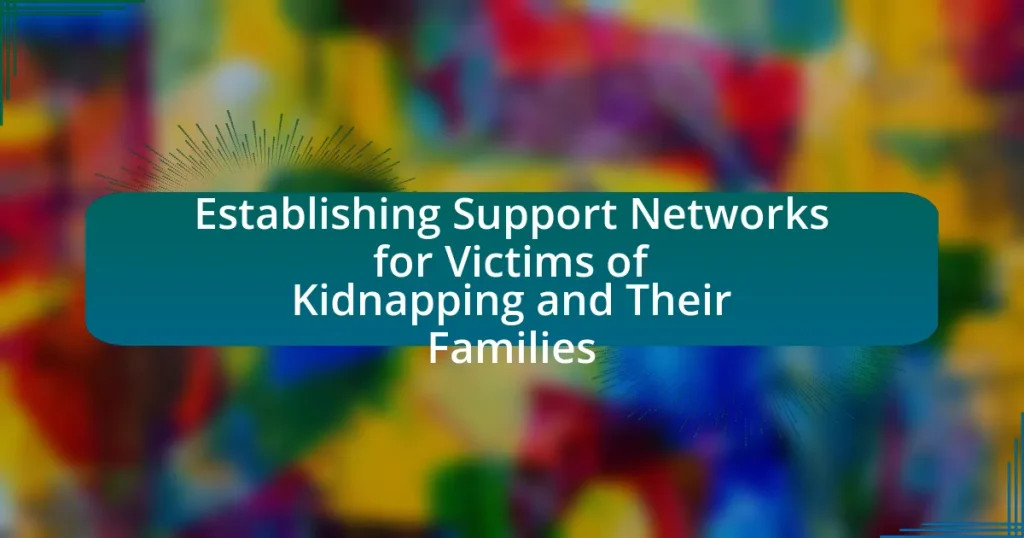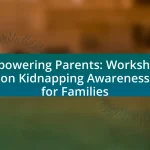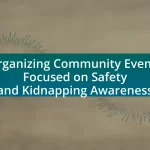Support networks for victims of kidnapping and their families encompass a range of organizations, community groups, and professionals dedicated to providing emotional, psychological, and practical assistance. These networks include law enforcement, mental health services, and advocacy groups that collaborate to address the complex needs of victims and their families. The article outlines how these support systems function, the types of organizations involved, and the essential resources they provide, such as counseling and legal assistance. It also discusses the psychological impacts of kidnapping, the challenges families face in accessing support, and the importance of community involvement in strengthening these networks. Additionally, best practices for enhancing the effectiveness of support networks and practical steps families can take to build their own support systems are highlighted.
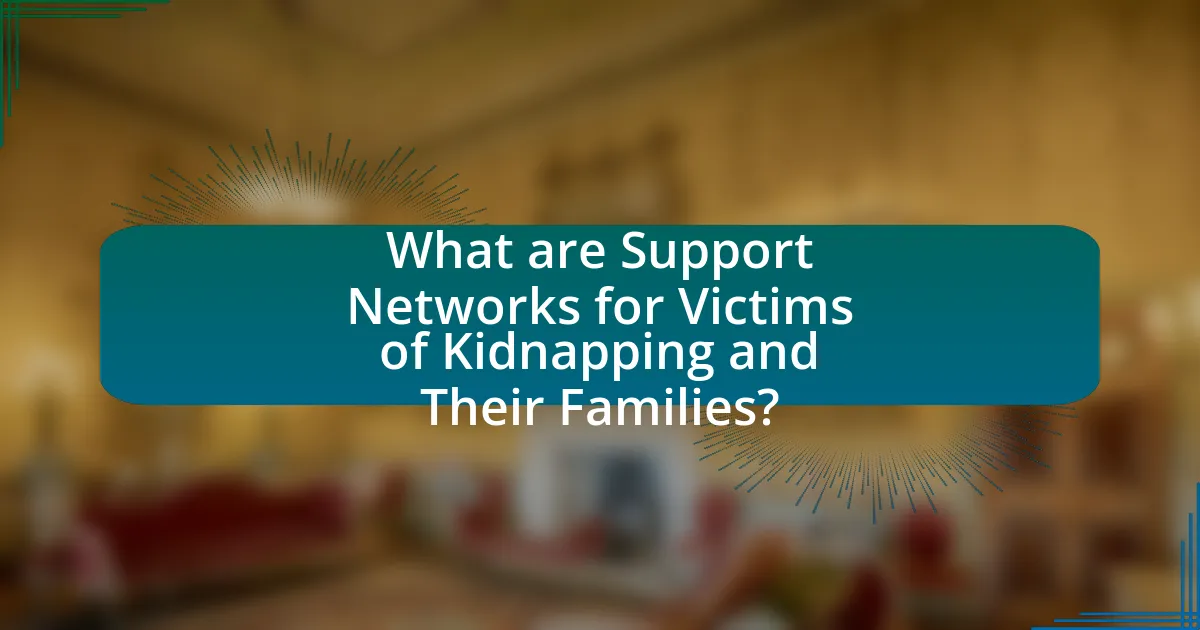
What are Support Networks for Victims of Kidnapping and Their Families?
Support networks for victims of kidnapping and their families consist of organizations, community groups, and professionals that provide emotional, psychological, and practical assistance. These networks often include law enforcement agencies, mental health professionals, victim advocacy groups, and community support organizations that work collaboratively to address the needs of victims and their families. For instance, the National Center for Missing and Exploited Children offers resources and support for families dealing with abduction cases, highlighting the importance of coordinated efforts in recovery and healing.
How do these support networks function?
Support networks for victims of kidnapping and their families function by providing emotional, psychological, and practical assistance. These networks typically include professionals such as counselors, social workers, and law enforcement, as well as community members and organizations that offer resources and support. For instance, organizations like the National Center for Missing and Exploited Children provide guidance and resources to families, helping them navigate the complexities of recovery and reintegration. Additionally, peer support groups allow victims and families to share experiences and coping strategies, fostering a sense of community and understanding. Research indicates that such support can significantly improve mental health outcomes and resilience among victims and their families, highlighting the critical role these networks play in the recovery process.
What types of organizations are involved in these networks?
Various organizations are involved in support networks for victims of kidnapping and their families, including non-governmental organizations (NGOs), law enforcement agencies, mental health services, and community support groups. NGOs often provide resources, advocacy, and counseling services tailored to the needs of victims and their families. Law enforcement agencies play a crucial role in the recovery process and offer guidance on safety measures. Mental health services are essential for addressing the psychological impact of kidnapping, providing therapy and support. Community support groups foster peer connections and shared experiences, enhancing emotional resilience among affected families.
How do these organizations collaborate to provide support?
Organizations collaborate to provide support for victims of kidnapping and their families through coordinated efforts that include resource sharing, joint training programs, and the establishment of communication networks. For instance, non-profits, law enforcement agencies, and mental health organizations often work together to create comprehensive support systems that address the emotional, legal, and logistical needs of victims and their families. This collaboration is evidenced by initiatives such as the National Center for Missing and Exploited Children, which partners with local law enforcement and community organizations to provide resources and support services. Additionally, these organizations may hold joint workshops and seminars to train staff on best practices for assisting victims, ensuring a unified approach to care and support.
Why are support networks essential for victims and their families?
Support networks are essential for victims and their families because they provide emotional, psychological, and practical assistance during a traumatic time. These networks help victims process their experiences, reduce feelings of isolation, and facilitate recovery by connecting them with resources such as counseling and legal aid. Research indicates that social support significantly enhances resilience and coping strategies, which are crucial for healing after traumatic events like kidnapping. For instance, a study published in the Journal of Traumatic Stress found that individuals with strong social support systems reported lower levels of post-traumatic stress symptoms. Thus, support networks play a vital role in the recovery journey for victims and their families.
What psychological impacts do kidnapping incidents have on victims?
Kidnapping incidents have profound psychological impacts on victims, including post-traumatic stress disorder (PTSD), anxiety, depression, and feelings of helplessness. Research indicates that approximately 30% of kidnapping survivors experience PTSD, characterized by flashbacks, severe anxiety, and uncontrollable thoughts about the traumatic event. Victims often struggle with trust issues and may develop social withdrawal, impacting their relationships and daily functioning. A study published in the Journal of Traumatic Stress highlights that the severity of psychological effects correlates with the duration of captivity and the nature of the experience, emphasizing the need for targeted psychological support for recovery.
How can support networks mitigate these impacts?
Support networks can mitigate the impacts of kidnapping by providing emotional, psychological, and practical assistance to victims and their families. These networks offer a safe space for sharing experiences, which can reduce feelings of isolation and anxiety. Research indicates that social support significantly enhances recovery outcomes for trauma survivors, as evidenced by a study published in the Journal of Traumatic Stress, which found that individuals with strong support systems reported lower levels of PTSD symptoms. Additionally, support networks can facilitate access to professional resources, such as counseling and legal aid, which are crucial for navigating the aftermath of kidnapping. By fostering connections among victims, families, and community resources, support networks play a vital role in the healing process.
What challenges do victims and families face in accessing support?
Victims and families face significant challenges in accessing support, primarily due to stigma, lack of awareness, and insufficient resources. Stigma surrounding victimization can lead to feelings of shame and isolation, deterring individuals from seeking help. Additionally, many victims and their families may not be aware of available support services, which can hinder their ability to access necessary assistance. Furthermore, limited funding and resources for support organizations can restrict the availability and quality of services, making it difficult for victims and families to receive timely and effective help. These factors collectively create barriers that complicate the process of obtaining support for those affected by kidnapping.
What barriers exist in the formation of effective support networks?
Barriers in the formation of effective support networks for victims of kidnapping and their families include stigma, lack of resources, and communication challenges. Stigma surrounding victimization can deter individuals from seeking help, as they may fear judgment or social isolation. Additionally, limited financial and emotional resources can hinder the ability to create and sustain support networks, as families may struggle to access necessary services. Communication challenges arise from the trauma experienced, which can affect individuals’ willingness or ability to share their experiences and needs, further complicating the establishment of supportive relationships.
How can these barriers be overcome?
Barriers to establishing support networks for victims of kidnapping and their families can be overcome through targeted community engagement, resource allocation, and collaboration with law enforcement. Community engagement fosters trust and encourages victims and families to seek help, while resource allocation ensures that necessary services, such as counseling and legal assistance, are available. Collaboration with law enforcement can enhance communication and provide a safe environment for victims to share their experiences. Research indicates that communities with strong support networks report higher recovery rates for victims, demonstrating the effectiveness of these strategies in overcoming barriers.
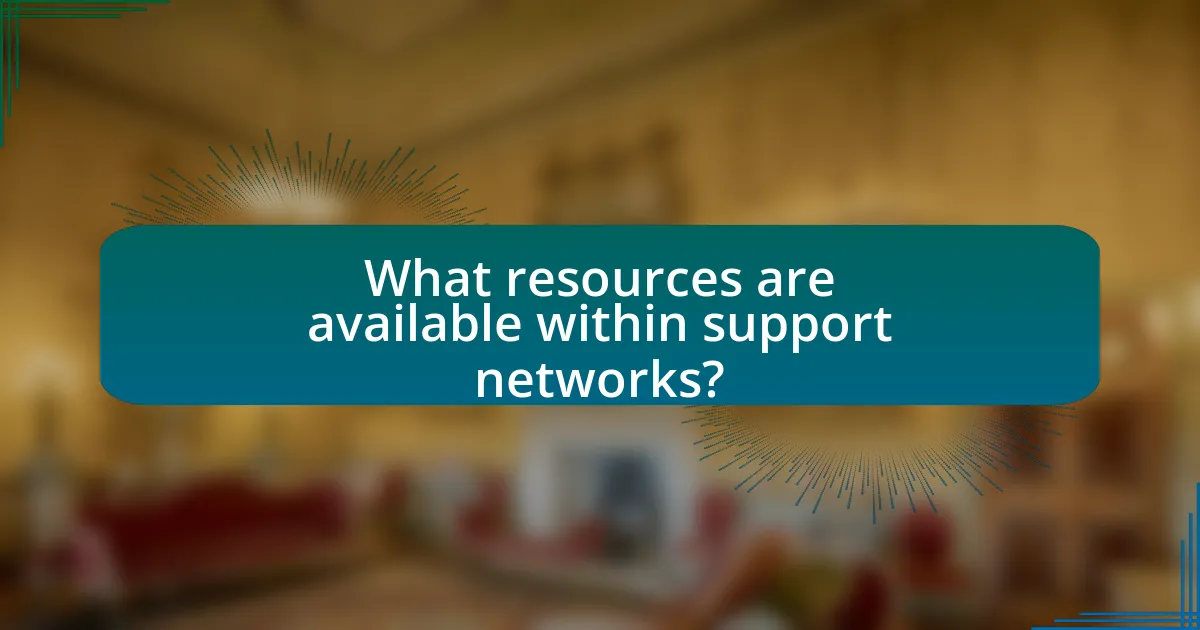
What resources are available within support networks?
Support networks for victims of kidnapping and their families provide various resources, including emotional support, legal assistance, financial aid, and access to counseling services. Emotional support is often facilitated through peer support groups, where individuals share experiences and coping strategies. Legal assistance may include guidance on navigating the legal system, understanding victims’ rights, and obtaining protective orders. Financial aid can come from non-profit organizations that offer grants or funds to help families cover expenses related to the kidnapping incident. Counseling services are typically available through mental health professionals specializing in trauma and crisis intervention, helping families process their experiences and develop coping mechanisms. These resources are essential for aiding recovery and rebuilding lives after such traumatic events.
What types of services do these networks provide?
Support networks for victims of kidnapping and their families provide a range of essential services, including emotional support, legal assistance, crisis intervention, and rehabilitation programs. These services are designed to help victims and their families cope with the trauma of kidnapping, navigate the legal system, and facilitate recovery. For instance, emotional support services often include counseling and peer support groups, which have been shown to significantly improve mental health outcomes for trauma survivors. Legal assistance may involve helping families understand their rights and options during investigations, while crisis intervention services provide immediate help in the aftermath of a kidnapping incident. Rehabilitation programs focus on long-term recovery, offering resources for physical and psychological healing.
How do counseling services help victims and families?
Counseling services provide essential emotional support and coping strategies for victims of kidnapping and their families. These services help individuals process trauma, reduce feelings of isolation, and develop resilience through therapeutic techniques. Research indicates that trauma-informed counseling can significantly improve mental health outcomes, as evidenced by a study published in the Journal of Traumatic Stress, which found that victims who engaged in counseling reported lower levels of PTSD symptoms and improved overall well-being. By facilitating communication and understanding within families, counseling services also strengthen relationships, enabling families to support each other more effectively during recovery.
What role do legal services play in support networks?
Legal services play a crucial role in support networks for victims of kidnapping and their families by providing essential legal guidance and representation. These services help victims navigate the complexities of the legal system, ensuring their rights are protected and that they receive appropriate compensation and justice. For instance, legal professionals can assist in filing restraining orders against perpetrators, advocating for victims in court, and helping families understand their legal options regarding recovery and restitution. The presence of legal services in support networks enhances the overall effectiveness of these networks by empowering victims and their families with the knowledge and resources necessary to confront their situations legally and effectively.
How can families find and connect with these resources?
Families can find and connect with resources for victims of kidnapping by utilizing local and national support organizations, online platforms, and community outreach programs. Organizations such as the National Center for Missing and Exploited Children provide comprehensive resources, including hotlines and support groups, which can be accessed through their website. Additionally, families can engage with local law enforcement agencies that often have connections to victim support services. Community centers and social service agencies may also offer workshops and information sessions to help families navigate available resources. These methods ensure that families can effectively access the support they need during a crisis.
What online platforms exist for connecting with support networks?
Online platforms that exist for connecting with support networks include Facebook Groups, Reddit, and specialized websites like Care.com and SupportGroups.com. Facebook Groups allow users to join communities focused on specific issues, including support for victims of kidnapping. Reddit hosts various subreddits where individuals can share experiences and seek advice. Care.com provides resources and connections for families in crisis, while SupportGroups.com offers a platform for individuals to connect with others facing similar challenges. These platforms facilitate communication and support among users, enhancing the ability to form networks for those affected by kidnapping.
How can local community organizations assist in this process?
Local community organizations can assist in establishing support networks for victims of kidnapping and their families by providing resources, emotional support, and advocacy. These organizations often have established connections within the community, enabling them to mobilize volunteers and professionals who can offer counseling services, legal assistance, and crisis intervention. For instance, organizations like the National Center for Missing and Exploited Children provide training and resources to local groups, enhancing their ability to support affected families effectively. Additionally, community organizations can facilitate support groups, allowing families to share experiences and coping strategies, which has been shown to improve emotional resilience in trauma survivors.
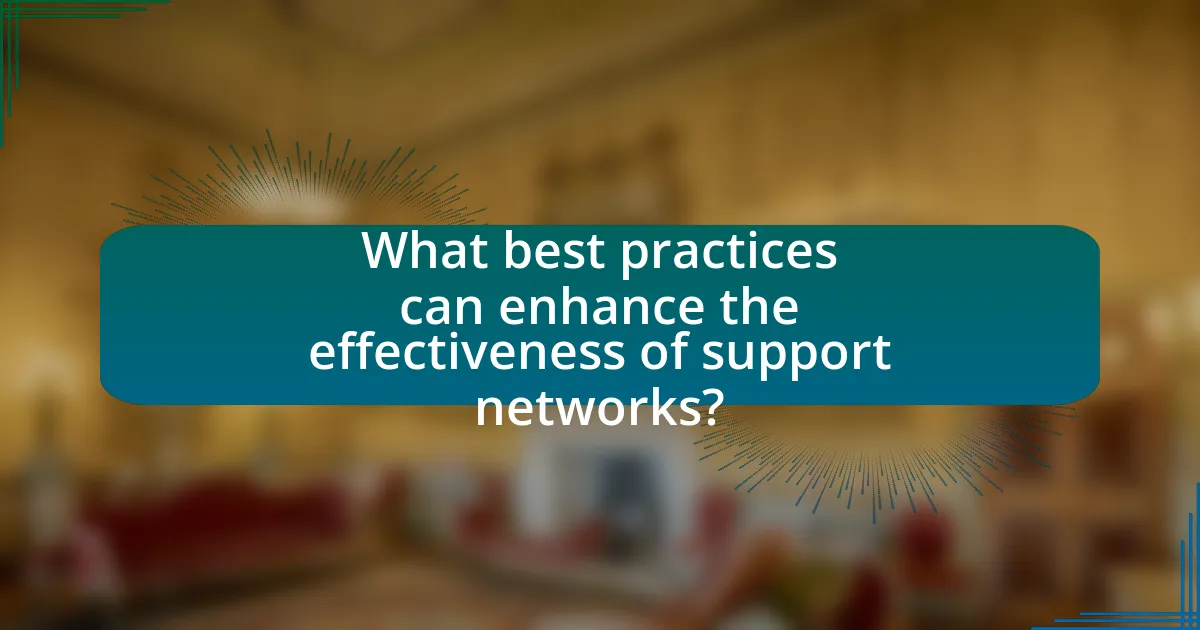
What best practices can enhance the effectiveness of support networks?
Best practices that can enhance the effectiveness of support networks include fostering open communication, providing tailored resources, and ensuring consistent follow-up. Open communication allows victims and their families to express their needs and concerns, which can lead to more effective support. Tailored resources, such as counseling services and legal assistance, address specific challenges faced by victims of kidnapping, making the support more relevant and impactful. Consistent follow-up ensures that individuals feel valued and supported over time, which is crucial for their recovery process. Research indicates that networks with these characteristics significantly improve the emotional and psychological well-being of victims and their families, as evidenced by studies showing increased satisfaction and engagement in support services.
How can training improve the response of support network members?
Training can significantly enhance the response of support network members by equipping them with essential skills and knowledge tailored to the unique challenges faced by victims of kidnapping. This training can include crisis intervention techniques, effective communication strategies, and understanding the psychological impact of trauma, which collectively enable support members to respond more empathetically and effectively. Research indicates that trained individuals are better prepared to manage high-stress situations, as evidenced by a study published in the Journal of Traumatic Stress, which found that training in trauma-informed care improved the responsiveness and effectiveness of support personnel in crisis scenarios.
What specific skills should support network members develop?
Support network members should develop skills in active listening, empathy, crisis intervention, and resource navigation. Active listening enables members to fully understand the needs and emotions of victims and their families, fostering trust and open communication. Empathy allows members to connect on a personal level, which is crucial for providing emotional support. Crisis intervention skills equip members to effectively respond to immediate needs and stabilize situations, while resource navigation skills help them guide families to appropriate services and support systems. These skills are essential for creating a supportive environment that addresses the complex challenges faced by victims of kidnapping and their families.
How can ongoing education benefit these networks?
Ongoing education can enhance support networks for victims of kidnapping and their families by providing them with updated knowledge and skills to effectively address trauma and recovery. Continuous training equips network members with the latest psychological strategies, legal information, and crisis management techniques, which are crucial for supporting victims. Research indicates that informed support systems can significantly improve recovery outcomes, as evidenced by a study published in the Journal of Traumatic Stress, which found that well-educated support networks lead to better emotional and psychological resilience in victims.
What role does community involvement play in strengthening support networks?
Community involvement is crucial in strengthening support networks for victims of kidnapping and their families. Active participation from community members fosters a sense of belonging and solidarity, which is essential for emotional and psychological support. Research indicates that communities with strong social ties can provide resources such as information, financial assistance, and emotional support, which are vital for recovery. For instance, a study published in the Journal of Community Psychology found that community engagement significantly enhances resilience among affected families, leading to better coping mechanisms and recovery outcomes. Thus, community involvement not only builds trust but also creates a robust framework of support that is indispensable for those impacted by kidnapping.
How can community awareness campaigns raise support for victims?
Community awareness campaigns can raise support for victims by educating the public about the challenges faced by victims and fostering empathy within the community. These campaigns often utilize various media platforms to disseminate information, share personal stories, and highlight the need for support services, which can lead to increased community involvement and resource allocation. For instance, a study by the National Center for Victims of Crime found that communities with active awareness campaigns reported a 30% increase in volunteer participation for victim support services. This demonstrates that informed communities are more likely to engage in supportive actions, ultimately benefiting victims and their families.
What initiatives can encourage volunteer participation in support networks?
Initiatives that can encourage volunteer participation in support networks include targeted outreach programs, training workshops, and recognition events. Targeted outreach programs can effectively engage potential volunteers by highlighting the specific needs of victims of kidnapping and their families, thereby fostering a sense of purpose. Training workshops equip volunteers with the necessary skills and knowledge to provide effective support, which can increase their confidence and commitment. Recognition events celebrate the contributions of volunteers, reinforcing their value within the network and motivating continued participation. Research indicates that volunteer retention rates improve significantly when individuals feel appreciated and connected to the cause, as evidenced by a study from the Corporation for National and Community Service, which found that recognition is a key factor in volunteer satisfaction and engagement.
What practical steps can families take to build their own support networks?
Families can build their own support networks by actively engaging with local community organizations, participating in support groups, and utilizing social media platforms to connect with others facing similar challenges. Engaging with local organizations provides access to resources and information tailored to their needs, while support groups offer emotional and psychological assistance from those who understand their situation. Social media platforms can facilitate connections with a broader audience, allowing families to share experiences and advice, which fosters a sense of community and belonging. These steps are essential for creating a robust support system that can help families navigate the complexities of their circumstances.
